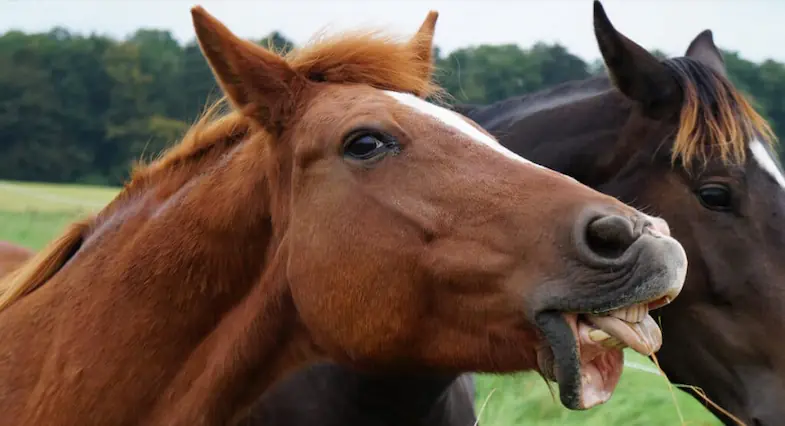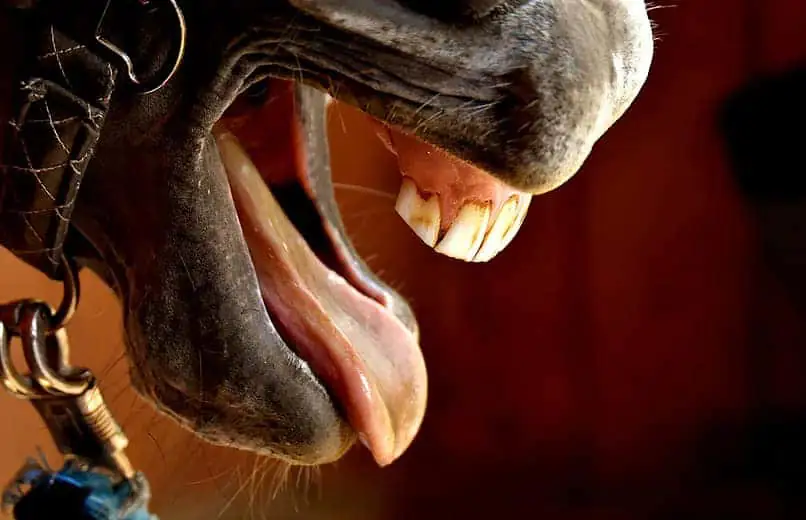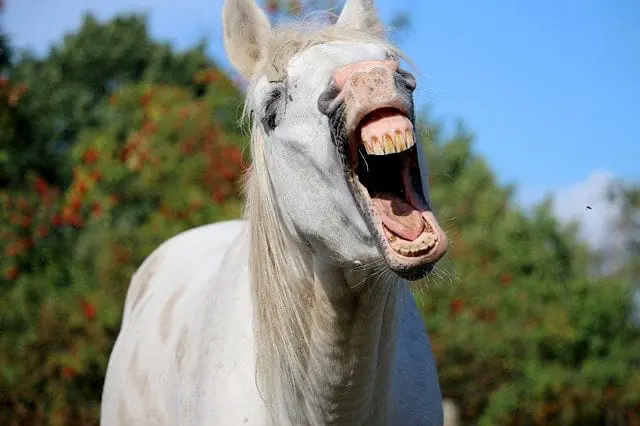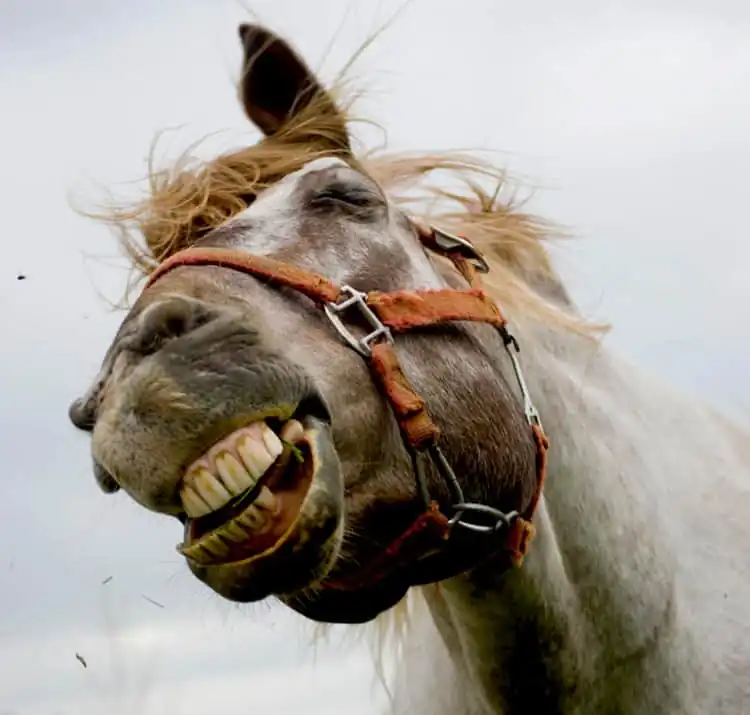The question ‘what does it mean when a horse shows its teeth‘ is an age-old one but one that doesn’t seem to have been fully answered, at least not as far as I know. Part of the reason for this lack of an answer is the fact that the question itself is pretty broad, it’s like asking why do people talk!
A lot of non-horsey people believe that if a horse is showing you their teeth it means they’re going to try and bite you, but this couldn’t be further from the truth. Horses very really bite but regularly show their teeth, which begs the question what does it mean when a horse shows their teeth?
Horses show their teeth as a primary means of communication (in conjunction with other forms of body language) with us and other horses and while it can be a sign of aggression, nine times out of ten there’s no negative meaning behind the action at all. In fact, some horses will even smile!
Why do horses show their teeth?
Just as we use language horses have their own language and their teeth play a big role in that. They can show their teeth when they’re happy, sad, feel threatened, or even when they’re in pain. The key to understanding what a horse is telling you is to read their whole body language, for example, a horse smelling the air will look similar to a horse that’s curling its top lip because they’re in pain. Horses can also, unintentionally, show their teeth as part of their natural behavior.
4 reasons why horses intentionally show their teeth
When horses intentionally bear their teeth they’re doing so for a reason and while, in some cases, it can be obvious why your horse is doing this it’s not always possible to tell why. Especially when you consider that horses have subtle ways of communicating with each other. This is why you shouldn’t just look at a horse’s teeth to see how they’re feeling, you need to look at their posture, their head (especially their ears), and even their tail. Together they’ll be able to tell you what your horse is saying, but below are the most common reasons why a horse chooses to display their teeth.
Flehmen Response
While horses have big nostrils that allow them to smell pretty well they will sometimes curl their top lip up (while stretching out their neck and raising their head) so that they can also taste the air. This behavior, known as the Flehmen Response, allows the horse to pick up the scent of chemicals such as pheromones in the air.
All horses can do this when there’s a strange or interesting odor in the air, such as a mare in heat, a new horse at the yard, or even the smell of fresh flowers but it’s far more common in stallions. That said though mares often do it after giving birth, it’s thought that they do this because they’re smelling their new foal.
Some people think that the Flehmen Response resembles a smile so will train their horse to do it on command by placing a strong smell under their nose then rewarding the response. This can make it difficult to tell whether the horse is genuinely smelling the air or just asking for a treat, especially if you don’t know the horse that well.
Aggression
If there’s nothing to stimulate your horse’s sense of smell (and to cause the Flehmen Response) and your horse is intentionally showing his teeth then its a sign of aggression and should be taken as a warning. There can be a variety of different reasons for this aggression so it shouldn’t always be taken as bad behavior.
Horses that have been startled (whether by another horse or a sudden loud noise) or are being harassed by another horse may show their teeth as a way of telling other horses that they’re unhappy with what’s just happened. Likewise, if a horse is trying to assert its authority and show they’re the boss they may bare their teeth, in this instance though the horse may also swish their tail violently (in a snapping motion) or stamp their foot.
Horses can also show their teeth aggressively if they’re feeling threatened and, while this may sound strange from our point of view, from a horse’s point of view it makes perfect sense. As well as showing their teeth they’ll often toss their head around or try and run away which signals to other horses that they don’t want a confrontation but will react if pushed.
Threat
While threatening behavior can often be confused with aggression (and look the same to the casual observer) the reason behind the action is fundamentally different. With aggression horses are expressing a reaction to something but with threatening behavior horses are anticipating something before it’s happened.
If a horse thinks another horse will try and take his food, for example, then he may show his teeth as a way of telling the other horse to back off. If the horse doesn’t listen then the baring of teeth may be followed up with a bite or kick.
Clacking teeth
Horses under the age of three will sometimes show their teeth while opening and semi-closing their mouth as if they were chewing, they can also, on occasions make a clacking sound which is where this behavior gets its name.
They’ll only clack their teeth (sometimes called champing) when they’re in unfamiliar surroundings or are around strange horses which is why many people believe they’re either calming themselves or are signaling to other horses that they’re not a threat.
3 reasons why horses show their teeth while eating
Horses are no different from us when it comes to eating, they all have their own habits and behaviors and while in most cases this doesn’t mean anything there are some occasions when your horse is showing his teeth while eating for a reason.
Stuck food
Some horses will flex their lips up and down (like your nana used to when she was adjusting her dentures) if they have food stuck in their lower teeth. It can look really funny but essentially the horse is trying to dislodge the food and, whereas we’d use a toothpick they don’t have that luxury so try to move it with their lips to get rid of the food.
Bad taste
Some horses, when they’ve eaten something that’s left a nasty taste in their mouth, or if they really dislike being dewormed, will separate their lips and repeatedly stick their tongue out. Just like many kids do when they’re trying to get the horrible taste out of their mouth.
If your horse does this every time you try to deworm him you can desensitize him to the syringe by filling an old one with mashed up banana or pureed apple and then squirting it into his mouth (as you would the paste) from time to time. He’ll soon learn to associate the syringe with something sweet and won’t pull silly faces after you’ve dewormed him.
Dental issues
Some horses will chew their tongue while they’re eating, exposing their teeth in the process. While there are horses that will chew their tongue without a reason (like we bite our fingernails), in most cases this sort of behavior is associated with some sort of pain or discomfort, typically a dental issue if they’re doing it while eating.
If your horse is doing this then look out for other tell-tell signs that he’s not happy, things such as he’s swishing his tail or his ears are back. If his teeth are causing him problems then he may not be eating as much or dropping some of his food on the floor.
4 reasons why horses inadvertently show their teeth
While horses intentionally show their teeth as a way of letting you (or other horses) know they’re unhappy about something or are in pain they can unintentionally display their teeth at other times too. The reason they’re exposing them though can vary so it’s important to look at your horse’s whole demeanor, for example, how is he standing, does he look relaxed, stressed, or frightened?
Happiness
One of my friends once had a barrel racer that enjoyed running the barrels so much he would actually smile while he was doing it. I know this might sound like a strange thing to say but, whilst it’s not common, some horses will turn the corners of their mouth up and show their teeth as if they were smiling.
Relaxed
When a horse is relaxed or content they often relax their faces and let their bottom lip droop which means they’ll also show their teeth. There’s no meaning behind this at all and is a consequence of them relaxing the lip.
Yawning
Most horses really make a meal out of yawning and will open their mouths wide, pull their lips right back, and stick their tongues out. Unlike a lot of other times when horses ]show their teeth there can be no mistaking when they’re yawning, typically they’ll stretch their necks out as much as they can too. Some horses will also contort their mouths too.
Pain
Understandably horses can’t tell us when they’re in pain but they can show us that they’re suffering and one way they do this is to show their teeth, as if they’re wincing, they’ll often curl up their top lip and expose their teeth. This is often a reaction to the pain being stimulated, such as if you touch a sore, sensitive or painful area but can also be a response to something that they perceive will hurt them, for example, if the saddle isn’t fitted properly they may react to you approaching them with a saddle.
When a horse is in pain it can look similar to the Flehmen Response (although they probably won’t stretch their neck or raise their head) so it’s important to look for other signs that your horse is in pain. For example, look at their ears and head as well as how they’re standing, also has their appetite changed or are they more lethargic than normal, and what about their breathing and heart rate, are they faster than normal? Knowing your horse’s vital signs will also help you to recognize if he’s showing his teeth due to pain.
If your horse is showing his teeth because he’s in pain then it’s important you find out what’s causing the pain and then address the problem. Your horse will only suffer if you don’t and it could lead to behavioral problems such as rearing.
4 more reasons why horses show their teeth
Just because your horse is displaying his teeth it doesn’t mean that he’s trying to tell you something or is letting you know how he feels. Sometimes horses expose their teeth as a consequence of another action.
Shaking
Horses can shake for a variety of reasons (such as if they’re wet, have rolled on dusty ground or are just relaxed) and in most cases, they’ll completely relax all of their muscles and shake their whole body rather violently (or at least it feels like that if they do it while you’re riding). This means that their lips will most likely part and flap as they shake their head, as a result their teeth will be exposed.
Vocalisation
Have you ever noticed when you’re talking to somebody how much they move their mouth and show their teeth, well horses are no different. They often show their teeth when they’re ‘talking’ to each other, not because they’re trying to but more because of the way they have to move their facial muscles to vocalize themselves.
In order to neigh, for example, horses need to open their mouths wide so that the sounds and reverberate, this action though means that the horse will inadvertently show his teeth, the same can be said for blowing. When a horse blows he inhales air through his nostrils before blowing it out through his mouth. While he’s doing this though he’ll relax his lips which means that, when he’s exhaling, the air forces his lips to open and close therefore exposing his teeth. Of course, neither of these actions involve the horse intentionally showing his teeth but the effect is still the same.
Sunburn
While it’s more common in Paint Horses and those with a large amount of white on their face (especially around their muzzle), some horses will unwittingly show their teeth (by gaping their lips whilst keeping their teeth closed) if they get sunburn around their lips. It’s believed that their lips become dry and chapped which can make it difficult for them to close their mouths properly without causing more discomfort.
If this happens to your horse try applying some sort of cream (such as Sudocrem) to the affected area will help to moisturize it and therefore allow the horse to close his mouth without discomfort.
Carrying the bit
If your horse is young and is new to the bit you may have noticed that his top lip curls up while you’re training him. Whilst this can often look similar to the Flehmen Response it’s actually your horse’s reaction to the relatively new experience of the bit, he’s demonstrating his confusion to the strange object in his mouth. This is one of the reasons why some training bits have ‘keys’ on them, they help to distract the horse and give him something to play with whilst also helping him to accept the bit.
Further reading
- Why do horses paw the ground?
- How to stop your horse rearing
- Beating your horse’s stall rest blues
- Bonding with your horse without riding
- Calming an anxious horse
- Equine vision: how do horses see?
- How to tell if your horse loves you?
- Why do horses choose to roll?
- Do horses really sleep standing up?
- Is your horse a windsucker?
I hope you found this article helpful. If you did I’d be grateful if you could share it please as it would really help me.
Recommended products
Over the years I have tried hundreds of different horsey products, from various blankets and halters to different treats. Some I’ve loved, others I’ve hated but I thought I’d share with you my top all-time favorite products, the ones I never leave the yard without. I’ve included links to the products (which are in no particular order) that I really think are great.
- Horse Knots by Reference Ready – If you’re like me and enjoy pocket reference guides then you’ll love this knot tying guide. These handy cards can easily fit in your pocket or attach to the saddle for quick reference. They’re waterproof, durable and are color coded to make them easy to follow.
- Mane ’n Tail Detangler – Even if you never show your horse you’ll need to detangle his tail from time to time (and possibly his mane too) which is always a challenging chore! I’ve found that if I run a little bit of detangler through my horse’s tails every few days it stops them from getting matted up and makes combing them easy, even if they’re coated in mud. I don’t know if I should admit to this or not but it also works wonders on my hair.
- TAKEKIT Pro clippers – Over the years I’ve tried a lot of different clippers and while some were obviously better than others I found these to be by far the best. They are heavier than a lot of other clippers but for me, that’s a good thing, it makes them feel more sturdy and hardwearing. On top of that they have a range of speeds so are just as good for clipping your horse’s back as they are his face. I also like the fact that they come in a handy carry case but that’s not for everybody. The company that makes them is super good and incredibly helpful too, a real bonus these days. The only thing I wasn’t keen on was the fact that it doesn’t come with any oil, but that’s not a major problem as it’s not difficult to buy lubricant.
- Shire’s ball feeder – There are so many boredom buster toys out there but I like to use these every day, regardless of whether or not my horses are bored. I find that it helps to encourage my horses to problem solve by rewarding them with treats (or pieces of fruit) but it also mimics their natural grazing behavior which helps to keep them calm and de-stressed.
- Horse safe mirror – This is a strange one that many people are surprised about but I like to put horse safe mirrors in the trailers as well as in the quarantine stalls. It helps to prevent the feeling of isolation by giving the impression of other horses being around. Being herd animals horses can get extremely stressed when they feel that they’re on their own but with these stick-on mirrors, they believe that at least one other horse is with them.
- Rectal thermometer – I know this isn’t glamourous at all but it’s vital for your horse’s well-being to be able to check their temperature and a rectal thermometer is the easiest way of doing this which is why I’ve added it to the list.
Shopping lists
I’ve also put together a few shopping lists of essential items that I’ve found helpful over the years. I’ve broken the lists down into different categories rather than put everything in one massive list 😉





